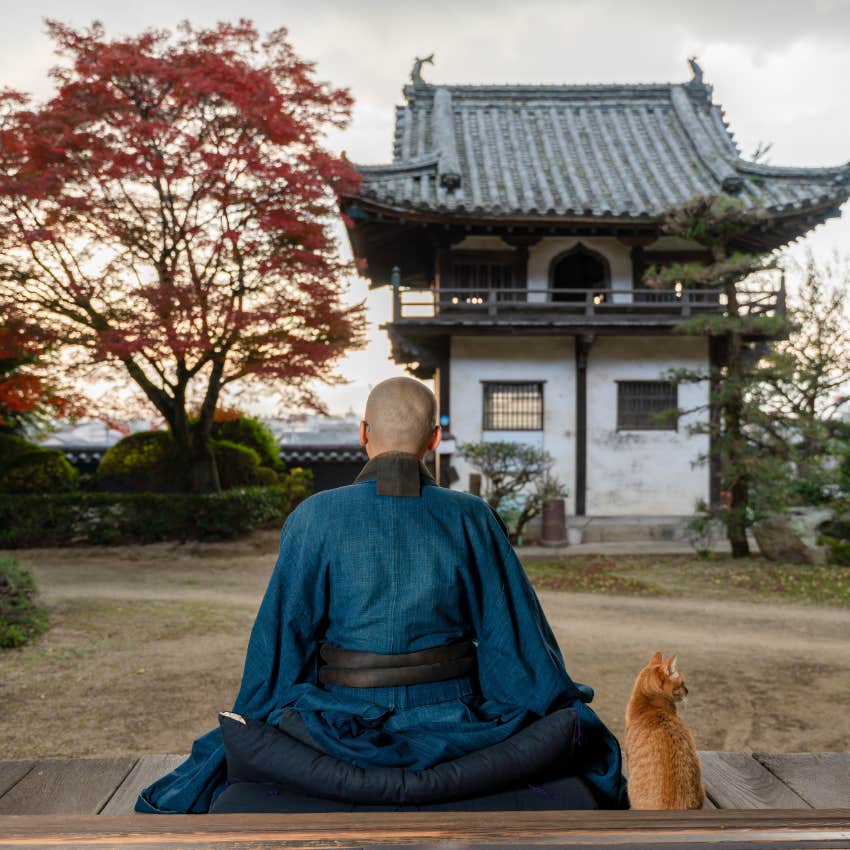7 Japanese Techniques To Help You Stop Overthinking When Your Brain Starts Spiraling
These practices can teach you to find tranquility amidst the noise of our minds.
 mediaphotos / Canva Pro
mediaphotos / Canva Pro The human brain is a powerful instrument, capable of problem-solving, creativity, and innovation, but it can often veer off course and plunge into the treacherous waters of overthinking.
It’s difficult to maintain control over our thoughts, and sometimes we unintentionally spiral down rabbit holes, creating unnecessary stress and anxiety in our lives.
Mindset Unchained, a digital platform on Instagram that posts content focused on mental wellness and self-improvement, shared some useful techniques rooted in Japanese traditions that can help calm your thoughts when your mind is racing.
These are the 7 Japanese techniques that promote mental clarity and can stop your brain from spiraling
1. 'Shouganai'
Shouganai essentially means “it is what it is” or “it can’t be helped,” usually referring to an unexpected negative outcome or situation. The phrase is used as an acknowledgment to accept things that are out of your control.
The concept of this phrase is to “embrace the unavoidable.” While our minds like to believe everything is in our control, the truth is quite the opposite. Life is full of pleasant and unpleasant surprises over which we have no control, but what we do have control over is how we respond to and perceive these situations.
Shouganai emphasizes the importance of resilience and adaptability in challenging experiences. Essentially, finding peace in relinquishing control will set you free.
2. 'Shinrin-yoku'
Shinrin-yoku, defined as “forest bathing,” is a practice dedicated to soaking in the environment of the forest to calm the mind.
Forest bathing is such an impactful practice because it allows the human mind to reconnect with nature. The practice of shinrin-yoku serves as a reminder to disconnect from the mind and find peace in the natural beauty that we were born into.
 Photo: U.J. Alexander / Canva Pro
Photo: U.J. Alexander / Canva Pro
The term was created by the Japanese Ministry of Agriculture, Forestry, and Fisheries in 1982, during a time of high-stress work culture, as a method to promote self-care. However, immersing oneself in nature is a practice that has existed long before the '80s with foundations linked to Buddhist traditions.
Research has shown that forest therapy can provide various health benefits in addition to relieving stress, such as reducing depression, anxiety, fatigue, insomnia, and chronic pain in individuals, as well as lowering cortisol levels and improving cognitive function.
3. 'Nenbutsu'
Nenbutsu is a form of meditation that means “mindfulness of Buddha.” The practice is prevalent in Buddhism and is intended to “gain enlightenment” and align with the pure energy of Buddha.
To practice nenbutsu, which is commonly transcribed as "nembutsu," individuals recite the chant “Namo Amida Bu” for five minutes a few times a day. By consistently engaging in this mindfulness tradition, individuals can bring themselves closer to their connection to the world, learn how to embrace gratitude, and adopt a “more meaningful way of life.”
This form of mindfulness can teach individuals how to calm their minds, better regulate their emotions, and foster more patience.
4. 'Zazen'
Also originated in the teachings of Buddha, zazen is the practice of sitting with correct posture. In fact, zazen is characterized as “Zen meditation” in Western culture, however, experts distinguish zazen as its own practice that is separate from meditation.
According to Dogen Zenji, a Buddhist priest and the founder of the Soto Zen tradition, zazen is a holistic body posture, rather than a state of mind.
 Photo: SAND555 / Canva Pro
Photo: SAND555 / Canva Pro
While meditation encourages the psychological mental practice of taking deep breaths, focusing on physical sensations, and actively quieting the mind, zazen simply emphasizes sitting in “kekka-fuza,” or “full lotus position.”
Zazen is uniquely different from meditation because while meditation focuses on calming the mind, zazen focuses on the balance of the “living holistic body-mind framework.” In other words, zazen is the practice of being one and whole with time and space.
5. 'Gaman'
Gaman can be defined as “bearing the seemingly unbearable with patience and dignity.” According to Psychology Spot, this technique “requires maintaining self-control and discipline in difficult times to face the storm in the best possible way.”
Life is always going to come with its obstacles and challenges. Gaman teaches individuals to handle difficult situations with grace so they build strength and resilience. The term encourages people to pick themselves up when life brings them down and take everything one day at a time.
This mentality is so significant in Japanese culture that gaman is taught to children from a young age so that they can learn the values of perseverance and tolerance. Subsequently, when faced with tragedy, individuals don’t break down and lose control. Rather they maintain a calm and strong attitude toward life.
6. 'Wabi-sabi'
Wabi-sabi is a combined expression of wabi and sabi, which convey their own meanings.
Wabi, which originally had a negative connotation, relating to pessimism and sadness, shifted to the notion that abundance and beauty are found in having less than what you need, similar to the phrase, “less is more.”
Sabi is the idea that beauty can be found in what is aged and deteriorated, for it holds history and character. This mentality is analogous to an individual’s continuous growth, development, and change.
These terms both similarly embrace and appreciate what many would perceive as unfavorable.
According to Nakamoto Forestry, “Wabi-sabi is to find the beauty behind something, its atmospheric feelings, not just its external appearance. There is an element of loss, of transience, but also abundance and transformation.”
By combining these terms, wabi-sabi elicits the abundance that can be found in accepting and appreciating imperfection. This technique helps individuals to embrace the imperfections within themselves and around the world and recognize the abundance that already lies within reach, reducing the overarching tendency to achieve perfection.
7. 'Ikebana'
Ikebana, which translates to “giving life to flowers,” is the Japanese art of flower arrangements. Rooted in Buddhist and Chinese tradition from the 6th century, ikebana, also known as “kado,” is one of Japan’s three classical arts.
The art involves careful attention to detail in arranging flowers, but more emphasis is placed on the stems and leaves. It is characterized as a meditative and spiritual practice to create harmony, peace, and beauty.
Ikebana has several principles to create a balanced appearance that is pleasing to the eye:
- Silence
- Minimalism
- Shape and line
- Form
- Humanity
- Aesthetics
- Structure
The symbolism of this practice is to improve the connection to nature through the delicate care of the flowers and to evoke tranquility and appreciation for the nature of life.
These techniques resemble deeper, symbolic values that can be applied to everyday life.
By learning and observing the cultural significance of these Japanese philosophies, one can learn to find balance in the mind, body, and spirit.
Overthinking is a natural byproduct of the human mind’s quest for control and certainty, but it leads to a downward spiral of anxiety. The mind can be trained to avoid these toxic patterns and embrace the imperfections in our lives.
Incorporating these practices into our lives can help us break free from the cycle of overthinking and cultivate a sense of peace and harmony.
Francesca Duarte is a writer on YourTango's news and entertainment team based in Orlando, FL. She covers lifestyle, human-interest, and spirituality topics.
